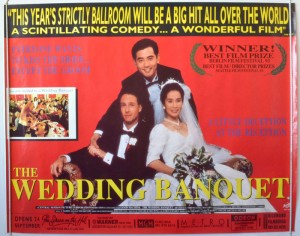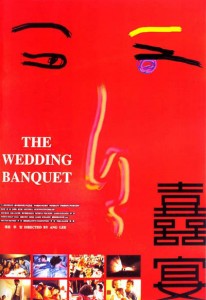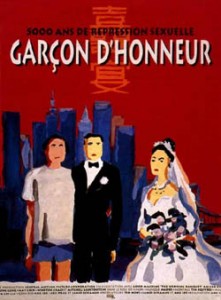 One of the pleasures of writing my book “Hope For Film” was examining many of my films for the lessons I’ve learned. The book is structured around ten core lessons although most of them include many different films. I learned a lot more than I could ever fit in one book. In going back and looking at my notes I realize of all my films, I might have learned most from Ang Lee’s 2nd film “The Wedding Banquet”.
One of the pleasures of writing my book “Hope For Film” was examining many of my films for the lessons I’ve learned. The book is structured around ten core lessons although most of them include many different films. I learned a lot more than I could ever fit in one book. In going back and looking at my notes I realize of all my films, I might have learned most from Ang Lee’s 2nd film “The Wedding Banquet”.
We wanted to make the film for $1.5 million but could only raise less than half but made it anyways. It may well have been the first narrative feature cut on an Avid, one of the first non-linear digital editing system, which may not have been ready for it when we used it. Every sales agent we approached to rep it, turned it down. We sold it ourselves despite never having done that before and made our investors more money than they ever expected. It won the Golden Bear at the Berlin Film Festival and was nominated for an Oscar for Best Foreign Language Film. It delivered one of the best ROI’s of the time at 43X multiple based on budget. We shared the profits with the crew despite not being required to do so. It launched one of our greatest directors career and taught us how to do business.
There are so many stories I could tell around that film I probably could have written a short book about it instead of just a single chapter.
 If I had more room and time, what would I have made sure I discussed? Well, I did hit some of this, and I think the nuances hold even more lessons, but the high points are:
If I had more room and time, what would I have made sure I discussed? Well, I did hit some of this, and I think the nuances hold even more lessons, but the high points are:
- The industry can not be counted to spot a diamond in the rough.
- The quickest way to raise the budget, is to cut in half (or in a tenth – now)
- If you don’t pay people well, you need to give them another reason to come to work.
- Lessons from community organizing.
- Give people what is best for them
- It is not always what they want
- You need a good bottle to hold any wine.
- Structure, discipline, and process allow creativity to flourish
- Just because others have not tried new technology or solutions, doesn’t mean they shouldn’t be tried.
- Art, artists, technology change faster than business or markets – and that can be a great advantage.
- Business people opt for the status quo over everything else.
- The Film Biz is about job protection first & foremost.
- The underserved audience is always very hungry
- Specificity is universal

- Speak about your village truly, and you speak about the world generally.
- Make it in English? No, make it in Mandarin.
- Combining the fresh and familiar are a formula for popularity.
- Sales agents did not want it because it was fresh (Gay & Chinese) and too familiar (told like a film from the forties)
- Audiences and critics love it because it was both familiar and fresh.
- Are you businessmen or artists/filmmakers? You can’t be both.
I could do blog posts on each of these takeaways. The book provides great details if I do say so myself. Please check it out. You can order it here from Powell’s or here from Amazon.
Kirkus dug it. So did the LA Times. And SF Weekly too. If you do, it means a lot if you write a positive review of it on Amazon — so please do.
You can also read an excerpt from the book about my time with Ang on CulturalWeekly here.





